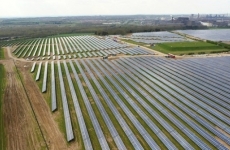Tata Steel could see the energy bills at its Scunthorpe steelworks increase this summer when a power purchase agreement (PPA) with a nearby solar farm comes to an end.
The Raventhorpe solar farm began generating energy for Tata Steel in April 2015 and cut the facility’s energy costs by £230,000 in less than a year.
However, the solar farm was bought from the original developer Kinetica by Fengate Capital Management in December 2015 and the Canadian firm has been working to connect the site to the national grid.
A spokesperson for Fengate told Clean Energy News this morning that a grid connection is imminent.
“The grid connection is expected to be completed in mid-June, which is a month ahead of the schedule set at the outset of the project,” she said.
“The main work to be completed is the cabling work to the local substation. There have been no issues and work is continuing ahead of schedule.”
The loss of the private-wire deal with the 39MW development will cost the Scunthorpe site, which has benefitted from the use of solar energy to mitigate the high energy bills incurred by energy intensive industries like steel.
Tata Steel was unwilling to comment on the loss of the site and the low cost energy it provides, or explain if it will be returning fully to energy from the grid instead of pursuing over renewable energy sources.
In addition to energy from Raventhorpe, Scunthorpe has enjoyed the same level of financial savings by receiving energy from a 2MW waste to energy project in Crosby.
The use of this site, as well as the nearby solar farm, would have allowed Tata to avoid paying the Climate Change Levy (CCL) on business energy use as until recently, renewable source power was exempt.
However, the government chose to remove this exemption on 1 August, which would have sent Tata’s tax bill up unless it had a Climate Change Agreement in place.
John Brewis, senior manager in the PwC indirect taxes team specialising in environmental taxes and chair of the Chartered Institute of Taxation environmental taxes working group, recently told CEN that this decision limited the availability of specific tax incentives to enter into large scale renewable scheme.





